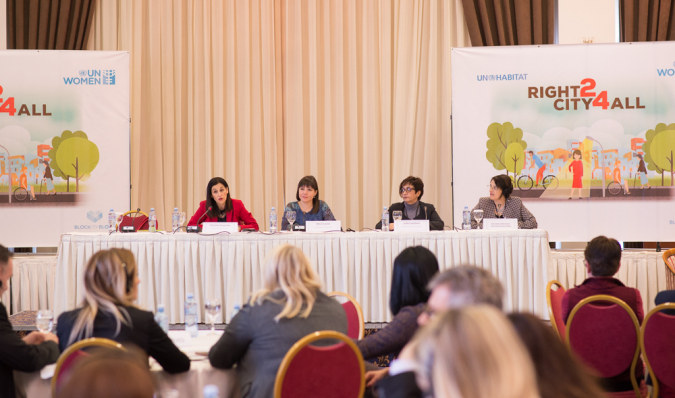Skopje’s Right to City for All conference puts women and girls’ safety first
Date:

As part of #16Days of Activism Campaign, UN Women joined forces with UN-HABITAT to organize a two-day regional conference on the Right to City for All in Skopje, which focused on the safety of women and girls in public spaces.
A high-level conference in Skopje examined legal, social, technological and other collaborative means of protecting women and girls in urban areas.
“Women’s and girls’ safety is rarely discussed, even though all of us women have faced fears to walk alone in dark alleys,” said Mila Carovska, Minister of Labour and Social Policy, the former Yugoslav Republic (fYR) of Macedonia, in her opening address to the gathering.
Emphasizing the importance of legislation that recognizes all forms of violence against women and girls, Minister Carovska announced that the Government had adopted a proposal on the Law on Ratification of the Istanbul Convention, a comprehensive legal framework to tackle violence against women.
The Right to City for All conference was organised by UN Women and UN-Habitat Kosovo. More than 80 participants attended, including top Skopje officials, UN and NGO representatives. Panellists from Italy, Serbia, France, India and Kosovo discussed their urban safety and public space development experiences and emphasized the importance of gender sensitive urban planning.
“The violence in public spaces, especially sexual harassment, is tolerated and perceived as a normal part of social life. Therefore, it is important for women and girls to be encouraged and freed from risk and fear of violence and harassment, with an aim to become active agents in public life,” said Dominika Stojanoska, Head of UN Women Skopje office.
Ljubica Jancheva, the President of the Council of the City of Skopje, said that Skopje is planning to become a gender equal city. Noting that it already has a gender equality strategy, she said that Skopje is now developing one with the urban safety of women and girls as a strategic goal.
Gwendoline Mennetrier, Head of UN-Habitat Office in Kosovo, noted that “there cannot be sustainable urban development without safety and there cannot be safety without sustainable urban development.”
The Skopje police and the NGO Girls Coding Kosova discussed urban safety experiences. The REAKTOR team from Skopje presented an interactive map used to identify harassments and assault hot spots in public spaces.
“We used new technology and anonymity to collect a lot of data on harassment, which often is not reported. This alerted local authorities about gender-based violence in public spaces. The idea is for all victims to report incidents on the platform. It enables women and girls a way to speak up,” says Tamara Resevska from REAKTOR.
The UN-Habitat Kosovo Office presented the regional project Towards enhanced Right to City for All, linked to Sustainable Development Goal (SDG) 5 on gender equality and SDG 11 on inclusive cities and showcased Pristina’s Public Space Profile and its policy-driven management and development.